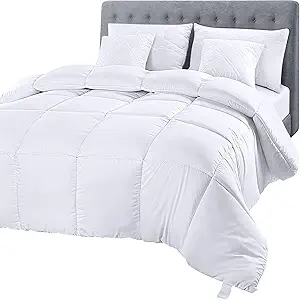The Ultimate Comforter Buying Guide: Types, Features, Prices & Tips
Overview
A good comforter is essential for a good night's sleep. But with so many options available, choosing the right one can be overwhelming. This guide will help you navigate the world of comforters, from different types to key considerations to features and prices. By the end, you'll be equipped with all the knowledge you need to find the perfect comforter for your needs and budget.
Types
- Down comforters: Filled with the soft, fluffy undercoating of geese or ducks, these are warm and cozy, yet breathable. Look for fill power, which measures the fluffiness and insulating power of the down. Higher fill power means more warmth and loft.
- Synthetic comforters: Made from materials like polyester or microfiber, these are often more affordable than down comforters and are hypoallergenic, making them a good choice for those with allergies.
- All-season comforters: Designed to be comfortable year-round, these comforters are usually made with a blend of down and synthetic materials to provide warmth without being too heavy.
- Quilts: These are typically made with a top layer of fabric and a layer of batting (often cotton or polyester) in between, and are stitched together in a decorative pattern. They're often lighter and less warm than comforters, making them a good choice for warmer climates or summer months.
- Duvets: A duvet is a soft, flat bag filled with down, feathers, wool, or a synthetic alternative. It's meant to be used with a duvet cover, which can be easily removed and washed.
Key Considerations
- Warmth level: Consider your climate and personal preferences when choosing a warmth level. Comforters are often rated as lightweight, medium-weight, or heavyweight.
- Size: Make sure to choose a comforter that fits your bed size. Standard sizes include twin, full/queen, and king.
- Material: Cotton is a popular choice for comforter covers, as it's breathable and soft. Microfiber is another option that's often more affordable.
- Hypoallergenic: If you have allergies or sensitivities, look for a hypoallergenic comforter.
- Machine washable: Consider how easy it is to care for your comforter. Some can be machine washed, while others require dry cleaning.
Features
- Thread count: This measures the number of threads woven into one square inch of fabric. Higher thread count can indicate a softer, more durable comforter cover.
- Baffle-box construction: This refers to the way the comforter is stitched to keep the filling in place. Baffle-box construction is often preferred, as it prevents the filling from shifting and creating cold spots.
- Gusseted edges: These are extra panels of fabric sewn onto the edges of the comforter, which create a three-dimensional shape and prevent the filling from shifting.
- Reversible: Some comforters are reversible, with different patterns or colors on each side.
Prices
Comforter prices can vary widely depending on the type, size, and features. Expect to pay anywhere from $50 to $500 or more for a high-quality comforter.
Tips
- Consider investing in a duvet cover to protect your comforter and make it easier to wash.
- Look for a comforter that's appropriate for your climate and personal preferences.
- Check the care instructions before purchasing to make sure you're comfortable with the maintenance requirements.
- Read customer reviews to get an idea of the comforter's quality and durability.
FAQs
Q: What's the difference between a comforter and a duvet?
A: A comforter is a thick, quilted blanket filled with down or synthetic materials, while a duvet is a soft, flat bag filled with down, feathers, wool, or a synthetic alternative. A duvet is meant to be used with a duvet cover, which can be easily removed and washed.
Q: How do I choose the right size comforter for my bed?
A: Choose a comforter that matches your bed size. Standard sizes include twin, full/queen, and king.
Q: How do I care for my comforter?
A: Check the care instructions before purchasing. Some comforters can be machine washed, while others require dry cleaning. Use a duvet cover to protect your comforter and make it easier to wash.
Q: Are down comforters better than synthetic comforters?
A: It depends on your personal preferences and needs. Down comforters are often warmer and more breathable, but they can be more expensive and may cause allergies in some people. Synthetic comforters are often more affordable and hypoallergenic, but may not be as warm or breathable as down comforters.













